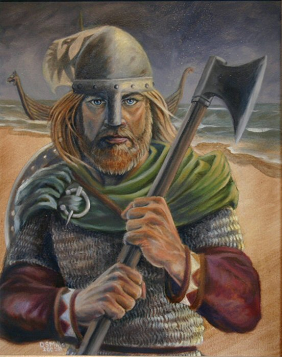The Russian Chechens  By German Sadulayev, special to Prague Watchdog
St. Petersburg
Someone recently posted on the Internet a podcast about a “forgotten campaign” the Vikings conducted in Chechnya during the eleventh century. There were mentions of a runic chronicle inscribed by the warrior Aki, of a leader named Sordzh, and many other details, including Viking burial grounds that had allegedly been discovered in Chechnya. The horde that set off for the North Caucasus was said to have numbered some 15,000 warriors. According to the podcast's author, they were all cut down by the brave ancestors of the Chechens and the Ingush.
Of course, no references to an Aki clan, a leader named Sordzh or a forgotten campaign are to be found in the scholarly literature, and the whole story looks like a tasteless hoax. Traces of an event of that magnitude would have remained in the historical sources, and in folk memory.
However, if something of the kind did take place – and we are entitled to that hypothesis, for the Vikings' energy knew no bounds, and they reached North America – it might have been because they believed that the Caucasus was the site of the city of Asgard, the city of the gods, and because Odin had commanded them to make an expedition to his sacred land. It would not have been an army of 15,000 men, of course, but some kind of migration might have taken place, and is indeed possible and even likely. And the fact of their disappearance in the Caucasus would have been quite logical. They were assimilated.
The Vikings did not aim to conquer the Chechens. They became Chechens. Just as they became Russians in Rus, and Frenchmen in France. For history contains no evidence of any large-scale battles or bloody war in the North Caucasus between the local tribes and the Viking horde.
This feature of the Viking campaigns has received little attention in traditional historiography. In the European chronicles the Norsemen are presented as mere savages and ruthless terminators. From those writings one has the impression that the reason for the success of the Vikings. who conquered almost half of the inhabited world, lay solely in their fighting prowess and limitless cruelty. But that is not the case. History knows many examples of infinite cruelty, but for the terminators themselves such episodes have always ended in tears.
The main reason for the geopolitical dominance of the Vikings in the early Middle Ages is thought to have resided in their willingness to assimilate, in their openness to new influences and in a certain paradoxical respect for the culture of the peoples they had subjugated.
History, of course, teaches nothing. But it is possible to draw conclusions: a successful military conquest is never built on the crushing and annihilation of another culture, but always, in one way or another, on an acceptance of it and an inclusion of it within one’s own.
The Russians proved to be the most adept followers of the Vikings in the history of warfare. When the Tatars conquered Rus, they did not become Russians. Instead, every Russian became a little bit of a Tatar. And the Horde passed into oblivion, while Russia remained. Having destroyed Napoleon’s armies, the Russians went to Paris and came back thoroughly Frenchified. They even tried to organize an imitation of the French Revolution in St. Petersburg, though it didn’t work out, of course.
And although the French were defeated, they didn’t become Russians, either. The only souvenir left behind by the Ulans and the Cossacks was the French word “bistro” – the Russian soldiers could not understand why the waiters in the restaurants served them so slowly, with European dignity. Seeing them as a foreign counterpart of their “servitors” at home, they shouted “quickly, quickly!” Special fast-food outlets were created specially for the Russians, and were called bistros, for the French language does not have the letter “ы”. And later came the McDonalds, for which we
ourselves are to blame.
Having crushed the German war machine in World War II, the peoples of the Soviet Union once again wandered across Europe. But this time the influence of German culture went no further than an aesthetic admiration for the black uniforms of the SS officers. And that war was Russia’s last victory.
One can make a joke of it: the swiftest and surest way for Russia finally and forever to defeat Chechnya would be to adopt Sharia law in place of the Russian Constitution and the Chechen Adats in place of the Civil Code, and to introduce Chechen as the official language throughout the country.
But if we are more serious, we can see that now – right now, alas – just as they were centuries and millennia ago, in addition to everything else, wars are a special means of inter-ethnic communication and cultural contact. They are the quickest and most effective way in which the elements of another culture can enter people’s consciousness and lives.
And the final historic victory goes not to those who kill more people of another nation and have the heavier cannon, but to those who make the best use of the opportunity for contact between different civilizations, and who carry out a cultural synthesis.
Picture: Elfwood. (Translation by DM ) (P,DM)
DISCUSSION FORUM
|

